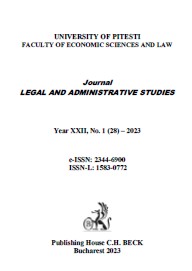FROM THE PRINCIPLE OF SUPREMACY OF LAW TO THE PRINCIPLE OF SUPREMACY OF LIBERTY
FROM THE PRINCIPLE OF SUPREMACY OF LAW TO THE PRINCIPLE OF SUPREMACY OF LIBERTY
Author(s): Marius Andreescu, Andra Puran, Ramona DuminicăSubject(s): Christian Theology and Religion, Constitutional Law, Human Rights and Humanitarian Law, Ethics / Practical Philosophy, Existentialism, Philosophy of Law, Ontology
Published by: C.H. Beck Publishing House - Romania
Keywords: freedom as moral value; characteristics of ontological freedom; the features of the legal freedoms; theological, philosophical and legal meanings of conscience and freedom of conscience;
Summary/Abstract: Any attempt in the sphere of humanities to characterize and explain man in his individuality, but also in the social existential context, relates to the issue of freedom. Freedom is essentially related to the human being, but also to the existential phenomenality of man. Man is the only created being whose fundamental ontological dimensions are freedom and spirit. In this study we briefly look onto the concept of freedom not only as a moral value or category, but also as an ontological dimension of man. In this way we make the distinction between ontological freedom and the legal freedoms established or recognized by the legal norms. The legal liberties are a phenomenal expression of human existence whose legitimacy and motivation is conferred by the ontological dimension of human freedom. In this context, the main features of the legal freedoms and the practical importance of the ontological meaning are to be found in the freedoms consecrated in the law. Conscience is a defining existential reality of man, whose meaning can be seen only through an interdisciplinary unceasing effort of thinking and knowledge. In this study, we propose to make such an analysis of the conscience as an ontological oundation and characteristic of man, in its individual and social dimension, whose basis is made up of philosophical, theological and legal ideas, concepts and theories. Freedom of conscience is the main feature of the manifestations of man as a person within the specific environment of his/her existence. From the legal point of view, freedom of conscience is a complex fundamental right requesting a wide legislative system in order to establish and guarantee it. In our opinion, both the basis and the legitimacy of the legal system protecting the freedom of conscience are given by the philosophical truths and the truths of faith, as expressed in theological writings and meditations. In this study, we identify the theological and philosophical bases of the freedom of conscience and their reflection in the legal field. In exceptional situations, such as the state of emergency or the state of alert established for a long time on the Romanian territory, the rulers have restricted the exercise of some essential fundamental rights, restrictions that seriously affect the private and social life of the people.
Journal: Studii Juridice şi Administrative
- Issue Year: 28/2023
- Issue No: 1
- Page Range: 55-72
- Page Count: 18
- Language: English

